

Defending rational expectations. Whenever I post anything which suggests that the idea of rational expectations was a useful innovation in macroeconomics, Lars Syll writes something to the effect that I am (and therefore most mainstream macroeconomists are) “so wrong, so wrong”.
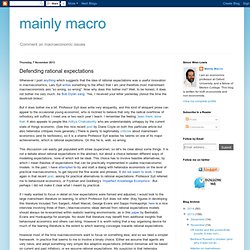
Now why does this bother me? Well, to be honest, it does not bother me very much. As Bob Dylan sang: ‘Yes, I received your letter yesterday (About the time the doorknob broke)’. But it does bother me a bit. Schumacher Center For New Economics. Doing Capitalism Innovation Economy Markets Speculation And State. The innovation economy begins with discovery and culminates in speculation.
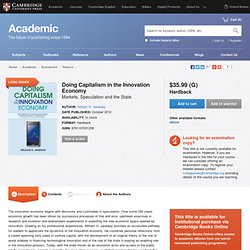
Over some 250 years, economic growth has been driven by successive processes of trial and error: upstream exercises in research and invention and downstream experiments in exploiting the new economic space opened by innovation. Drawing on his professional experiences, William H. Janeway provides an accessible pathway for readers to appreciate the dynamics of the innovation economy. Some thoughts on economics. From Peter Radford My instinctive entry point into economics is through business.
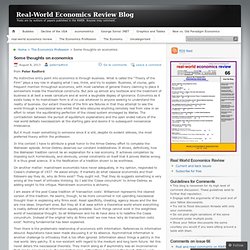
What is called the “Theory of the Firm” plays a key role in shaping what I see, think, and try to explain. Business, of course, gets frequent mention throughout economics, with most varieties of general theory claiming to place it somewhere inside the theoretical constructs. But pick up almost any textbook and the treatment of business is at best a weak caricature and at worst a laughable display of ignorance. Economics as it exists today in its mainstream form is of no use whatever to anyone seeking to understand the reality of business. But it must mean something to someone since it is still, despite its evident silliness, the most preferred theory within the profession.
In this context I have to attribute a great honor to the Arrow-Debreu effort to complete the Walrasian episode. On another matter: mainstream economists have never adequately, in my opinion, responded to Coase’s challenge of 1937. Helping Economists Escape Economics. There are plenty of economists who will happily admit the limits of their discipline, and be nominally open to the idea of other theories.
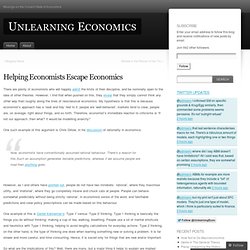
However, I find that when pushed on this, they reveal that they simply cannot think any other way than roughly along the lines of neoclassical economics. My hypothesis is that this is because economist’s approach has a ‘neat and tidy’ feel to it: people are ‘well-behaved’; markets tend to clear, people are, on average, right about things, and so forth. Therefore, economist’s immediate reaction to criticisms is “if not our approach, then what? Philip Pilkington: Economics as Machine – The Nature and Folly of the Forecasters. By Philip Pilkington, a writer and research assistant at Kingston University in London. You can follow him on Twitter @pilkingtonphil. People « Econ4. The Elgar Companion To Recent Economic Methodology by John B. Davis, D. W. Hands, - Edward Elgar Publishing. Series: Elgar original reference Available as an eBook for subscribing libraries on For individuals at paper price on and Other eBook partners.

Description Bringing together a collection of leading contributors to this new methodological thinking, the authors explain how it differs from the past and point towards further concerns and future issues. Contents Contributors: A. Further information. Part XVI: The Search for Alternatives. The final chapter Steve Keen’s Debunking Economics is a brief overview of the major competing alternative economic schools of thought.
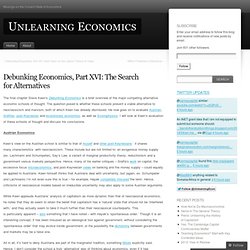
The question posed is whether these schools present a viable alternative to neoclassicism and marxism, both of which Keen has already dismissed. Why Gas Lines Are Like Bank Runs & Why Odd/Even Gas Rationing Actually Works. One of the major philosophical takeaways from the past 15 years has been the failures of the Efficient Market Hypothesis and the rise of Behavioral Economics.
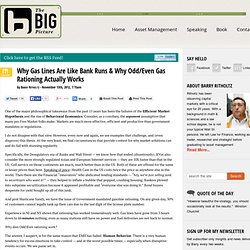
Consider, as a corollary, the argument assumption that many pro Free Market folks make: Markets are much more effective, efficient and productive than government mandates or regulations. I do not disagree with that view. However, every now and again, we see examples that challenge, and (even disprove) this thesis. At the very least, we find circumstances that provide context for why market solutions can and do fail with stunning regularity. Reviewed: The Locust and the Bee - Predators and Creators in Capitalism’s Future by Geoff Mulgan.
The Locust and the Bee: Predators and Creators in Capitalism’s Future Geoff MulganPrinceton University Press, 344pp, £19.95 “Capitalism,” writes Geoff Mulgan, “is not so much an aberration as a step on an evolutionary path, and one that contains within it some of the answers to its own contradictions.”

In thinking of capitalism in this way, Mulgan voices a contemporary consensus. As advances in biology and genetics have promoted the belief that economic and political development can be understood in evolutionary terms, hundreds if not thousands of books have appeared in recent years claiming to explain the rise and development of capitalism as part of an ongoing process of social evolution. This is not the first time that the idea of evolution has been invoked in this way. Owing more to Engels than Marx, who knew too much about history to imagine that it could be understood in Darwinian terms, there has long been a Marxian tradition that sees capitalism as a stage in social evolution. Lectures. New Economy Organizations.